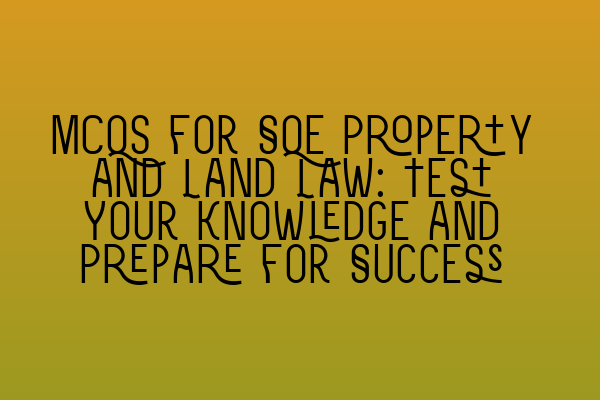MCQs for SQE Property and Land Law: Test Your Knowledge and Prepare for Success
Are you preparing for the SQE Property and Land Law exams? Do you want to test your knowledge and ensure you’re well-prepared for success? Look no further! In this article, we have compiled a list of multiple-choice questions (MCQs) that cover various topics within SQE Property and Land Law to help you assess your understanding. So, let’s dive in and test your knowledge!
1. Which of the following is NOT a type of freehold estate in English land law?
A) Fee Simple Absolute
B) Fee Tail
C) Life Estate
D) Leasehold Estate
Correct Answer: D) Leasehold Estate
Explanation: In English land law, leasehold estate is not a type of freehold estate. Leasehold estate refers to a temporary right to occupy or use a property, whereas freehold estates are indefinite and often last for a person’s lifetime.
2. What is the key characteristic of a joint tenancy?
A) The right of survivorship
B) The ability to transfer the interest without the consent of other joint tenants
C) Equal shares in the property
D) The requirement of a written agreement
Correct Answer: A) The right of survivorship
Explanation: The right of survivorship is a key characteristic of a joint tenancy. It means that if one joint tenant dies, their interest in the property automatically passes to the surviving joint tenants, without the need for probate.
3. Which legislation governs the creation and transfer of interests in land in England and Wales?
A) Trusts of Land and Appointment of Trustees Act 1996
B) Law of Property Act 1925
C) Land Registration Act 2002
D) Landlord and Tenant Act 1954
Correct Answer: B) Law of Property Act 1925
Explanation: The Law of Property Act 1925 is the primary legislation that governs the creation and transfer of interests in land in England and Wales. It introduced several reforms to simplify and modernize land law.
4. What is the maximum term allowed for an assured shorthold tenancy in England?
A) 6 months
B) 1 year
C) 2 years
D) 5 years
Correct Answer: D) 5 years
Explanation: The maximum term allowed for an assured shorthold tenancy in England is 5 years. After this period, the tenancy may continue on a periodic basis unless terminated by the landlord or tenant.
5. True or False: Easements can only be created by express grant or reservation.
Correct Answer: False
Explanation: Easements can be created by express grant or reservation, but they can also be created by implication, necessity, or prescription. These methods allow for the creation of easements even without an explicit agreement between parties.
Congratulations on completing the MCQs! You have taken a step towards improving your understanding of SQE Property and Land Law. To further enhance your knowledge and preparation, we recommend exploring the following related articles:
- Updates in UK Property Laws: Key Changes and Implications
- Legal challenges in property transactions: A comprehensive guide
- Navigating Lease Laws in the UK: Essential Guidelines for Tenants and Landlords
- Dominate Property Law Questions: Avoiding Common Pitfalls
- Land Law Revision Tips: Ace Your Exam Preparation
We hope this article and the suggested resources will assist you in your SQE Property and Land Law exam preparation. Best of luck!
